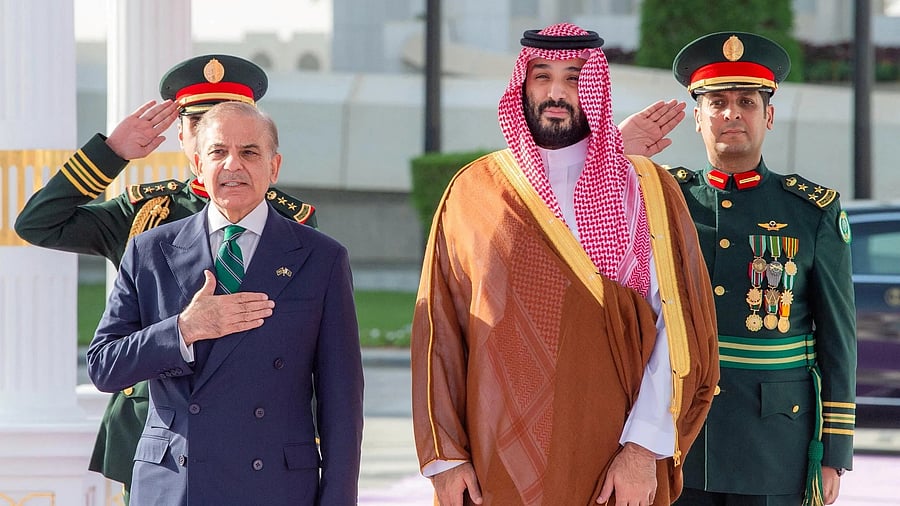
Saudi Crown Prince Mohammed bin Salman and Pakistan Prime Minister Shehbaz Sharif meet in Riyadh, Saudi Arabia.
Credit: Reuters Photo
The recently signed mutual defence agreement between Saudi Arabia and Pakistan has the potential to transform the security architecture of South Asia and the Gulf region. For decades, the close security relationship between Riyadh and Islamabad has been an open secret, but the latest development takes that long-standing understanding to a different level. The pact, declaring that an attack on one country will be treated as an attack on both, represents a strategic recalibration in a region already reeling from war, power vacuums, and shifting alliances. It also poses significant challenges to India’s security and diplomatic calculus.
For Gulf states unnerved by the prolonged Israel-Hamas conflict and the devastation in Gaza, the Israeli strike on Doha in Qatar, where senior Hamas leaders were reportedly staying, reinforced fears that their security could be violated with impunity. More troubling was the soft response of the United States, traditionally the guarantor of Gulf security. Washington’s silence deepened perceptions of US retrenchment, a trend visible since the cautious US reaction to the 2019 attacks on Saudi oil facilities by Iranian-linked forces. For Saudi Arabia, long reliant on the American security umbrella, the episode underscored the need to diversify alliances and hedge against American unpredictability.
Pakistan fits naturally into this equation. A long-time partner of Riyadh and the only Muslim-majority country with nuclear weapons, Islamabad offers military expertise and deterrence. In a televised interview, Pakistan’s Defence Minister Khawaja Mohammad Asif stated that Pakistan’s nuclear capabilities “will be made available” to Saudi Arabia if required under the new agreement. This is the first open acknowledgement that Islamabad is willing to place the kingdom under its nuclear umbrella, an announcement that has an impact in both the Middle East and South Asia.
Pakistani officials insist the pact is not aimed at any specific country, but it is clear that Pakistan is responding to recent Israeli actions and a shifting regional order. For Pakistan, it provides an opportunity to position itself as a key Gulf security actor at a time when the US role is diminishing. Islamabad stands to gain not only geopolitical leverage but also the possibility of renewed Saudi financial assistance.
In the Gulf, the agreement complicates an already volatile environment. The US-brokered Abraham Accords, which sought to bring Arab states and Israel into a common anti-Iran front, have been undermined by the Gaza conflict and Israel’s aggressive actions. Saudi plans to normalise relations with Israel have stalled. By aligning more closely with Pakistan, Riyadh signals that it will chart an independent course and seek security guarantees outside the framework of US and Israeli influence. Other Gulf states could be emboldened to explore similar arrangements, further eroding the old security order.
For South Asia, the stakes are equally high. Pakistan’s willingness to extend its nuclear deterrence to Saudi Arabia adds a new layer of complexity to the region’s already fraught nuclear balance. India now faces the prospect of Pakistan’s nuclear capabilities being indirectly linked to the security of a major Gulf power.
India’s diplomatic challenge
Over the past decade, New Delhi has invested considerable effort in strengthening its strategic partnership with Saudi Arabia, expanding cooperation in trade, energy, and counter-terrorism. The Ministry of External Affairs has already stated that India expects Saudi Arabia to keep mutual interests and sensitivities in mind.
New Delhi must now tread carefully to preserve its ties with Riyadh while guarding against any security risks that may arise from the Saudi-Pakistan pact. It will face a challenge in maintaining strong relations with both Israel and the Arab world while ensuring its own security interests are not compromised.
The agreement also reflects the gradual decline of US influence in South Asia and West Asia. Washington’s inability or unwillingness to respond decisively to regional crises has created a vacuum that regional actors are now rushing to fill. China, which maintains close ties with both Pakistan and Saudi Arabia, will watch these developments closely, as will Iran, which remains a rival of both Riyadh and Islamabad.
The defence pact is a reminder that alliances in the modern world are fluid and driven by immediate security concerns rather than ideological affinity. For India, this is not a crisis but a wake-up call. It must adapt to a changing regional environment in which old assumptions about US dominance, Arab-Israeli rapprochement, and South Asian nuclear stability can no longer be taken for granted. The coming months will reveal how effectively New Delhi can navigate this new and unpredictable security landscape, where the lines between South Asia and West Asia are increasingly blurred and where the actions of distant capitals can have immediate consequences at home.
(The writer is an associate fellow at the Manohar Parrikar Institute for Defence Studies and Analyses)
(Disclaimer: The views expressed above are the author's own. They do not necessarily reflect the views of DH)